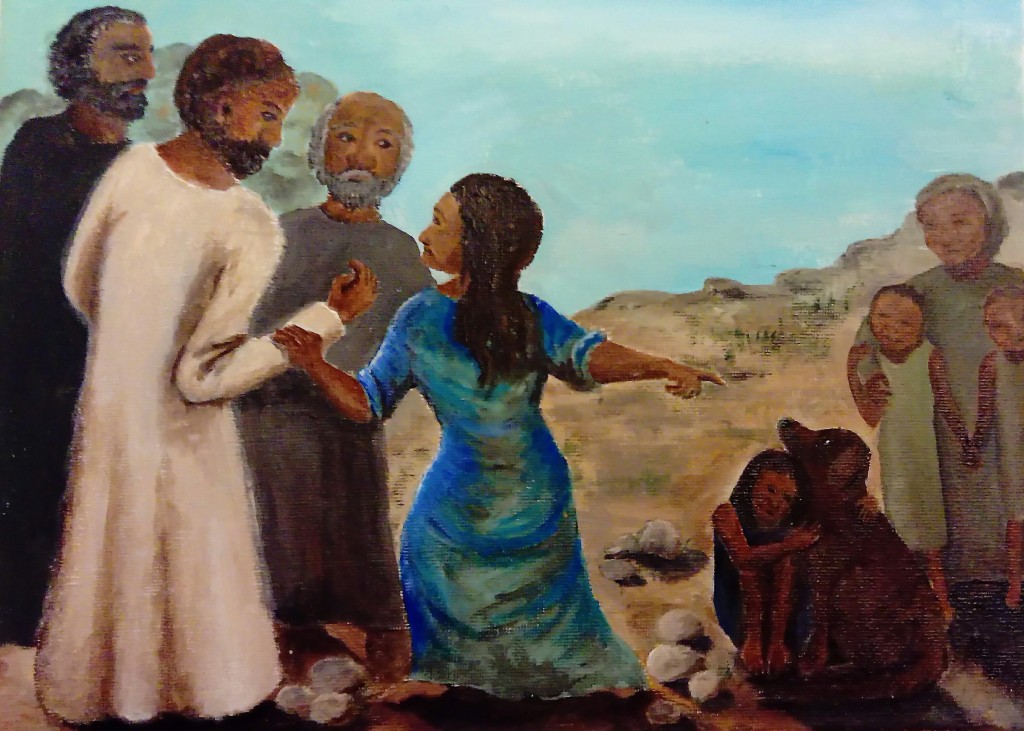a sermon for the Thirteenth Sunday after Pentecost [Proper 17A/Lectionary 22]
Matthew 16:21-28
Have you ever had the experience of starting a story or a movie thinking that you know what it’s about as it starts only to find out as you keep watching that it’s not what you expected? Or have you ever heard a recommendation from a friend about a book or read the book jacket and make assumptions the plot will take a certain trajectory but then once you’re into it, it turns out to go in another direction?

These kinds of things seem to happen to me all the time, for some reason, and sometimes it’s an actual, physical trajectory. One time many years ago I was traveling abroad with a friend and we wound up in one town where we had reservations for the night but neither of us spoke the language there. Everything was a little disorienting, but we were well-worn travelers so we figured where we needed to go and jumped on the subway. Nothing was written in English and we couldn’t understand the subway commander, but we were pretty sure we had chosen the right one. SLowly, after several stops, and trying to match what we thought we were hearing on the microphone system to the strange words on the signs outside, it occurred to us both at the same time that we were not on the correct train or line at all and we needed to disembark at the next station. Unfortunately we had only paid for a ticket in the direction we had initially taken, and we didn’t know if they’d let us back on the train going in the opposite direction. So we had to exit the whole system and re-board going in the correct direction, hopping over turnstiles and running up steps.
Well, that’s kind of what’s happening this morning with Peter and the other disciple as Jesus begins to show them he must go to Jerusalem and undergo great suffering. They are realizing the subway they’re on is going in a totally different direction than what they thought when they got on. They are realizing the plot of the story they are in is quite a bit different from the jacket on the back. They assumed this was a Galilee uprising, one where the next Messiah, the next God-chosen leader, would drum up enough grassroots support to be swept into power and crush the authorities in Jerusalem.
But instead, Jesus is heading to Jerusalem on his own, and he is heading right into the hands of the people he would overthrow. He is not avoiding suffering and death. He is aware of it and accepting it. They assumed they had boarded a train bound for glory, but it is a train headed toward a cliff. In fact, it is bound for glory, but not in the typical ways the world pursues it or imagines it.

We can hear Peter’s shock and disappointment as he tries to turn the train around. “God forbid it, Lord!” he bellows. “This must never happen to you!” But Jesus is determined. He is determined to overturn the powers of sin and death that plague God’s people by going straight into his crucifixion. And then Peter becomes the one who gets turned around. He goes from being called the Rock upon which the church shall be built to being the stumbling block of Jesus’ own mission.
The Greek word for stumbling block is “scandal.” We have seen some scandals in the news this week, and we can see how scandals trip people up—not just the people involved in them but all the people who look to a leader for guidance, counsel, and hope. Scandals make the way forward less clear, they chip away at clarity and vision. Peter’s insistence that Jesus not head to Jerusalem, that Jesus not accept this path of suffering and self-sacrifice immediately chips away at the clarity of God’s love and Jesus’ vision of the kingdom. Jesus does not need that kind of stumbling block in his way.
This is a critical moment in Matthew’s gospel. This is the point, quite literally, when Jesus leaves behind his Galilee home, the fishing and farming villages where he has made his name, and focuses on the seat of power in Jerusalem. But it is much more than a critical point in Matthew’s story. This is a crucial moment in understanding just who Jesus is. This is one of those moments where Peter and the gang and even the rest of us are going to have to decide whether we go ahead and finish the movie or read the book, whether we commit to the finishing point, even though it’s not turning out like we thought it would.

In his book Atheist Delusions, theologian David Bentley Hart explains that a suffering Son of God, a deity who dies, was a completely novel concept in the ancient world. I think two thousand years of Christian witness and singing about the cross has almost made the death of Jesus seem ordinary to us. We build churches and place crosses over the altar. We talk about his betrayal and death every time we gather for his holy meal. I hate to say it, but it almost feels old hat to us, but the idea that a divine power would stoop to this kind of self-giving was absolutely unheard of. Nowhere in the history of ancient religions and faiths, Hart says, was there anything like the path Jesus takes as a legitimate way of life, much less linked to God.
What we see in Jesus at this moment is a completely new and daring way to deal with the brokenness of the world. He’s not just going to patch things over with healings and new teachings. And he’s not going to enter Jerusalem and try to establish a benevolent regime through a people’s army or through pulling strings the right way, appointing the right allies, shoring up his defenses, and so on. Because no matter how well it might have turned out it would have just been a variation of all the other human ways that had already been tried. And ultimately it would have faded away until the next clever popular power came along. Jesus, rather, is going to try a divine way that involves handing himself over. Letting the suffering speak.
When we think about it, we realize the gift of Jesus is never old hat. The world still operates in the same old, self-proclaiming, violent, and hope-robbing ways. The cross of Jesus is still a new thing—always a new thing!—which is why in his call to his disciples he says they will take up a cross and follow. They will need to lose their life. This way of self-giving and unconditional loving happens now and it will always meet resistance. It meets resistance in ourselves, because we want an easier way that involves less pain. And it meets resistance from the world, because the world rewards self-promotion. To avoid being a stumbling block as this train moves forward, Jesus says to set our minds on divine things, not human things.

If you, like I, struggle to understand what that means, what setting my mind on divine things looks like, it helps to remember it actually means setting them on other humans; that is, serving them. We can see this pretty clearly if we look at Jesus’ life, but the apostle Paul, in his letter to the Romans, gives us a wonderful list of diving things, one right after another.
As it turns out, setting our mind on divine things is not ultimately based in things like mindfulness or yoga or memorizing Scripture or contemplating nature’s beauty, as much as those things may help. It involves paying attention to our neighbor and our relationship with him. In the list that Paul gives the Romans about how to offer their bodies as living sacrifices to God in thanksgiving for Jesus’ love, there are very few that have a personal or private dimension. Almost every single one of them is about building and mending our relationships with others: Love one another with mutual affection. Contribute to the needs of the saints. Extend hospitality to strangers. Bless those who persecute you. Weep with those who weep, rejoice with those who rejoice. Associate with the lowly.
When Jesus says we lose our lives to save it, it becomes clear that we are meant to lose ourselves at the feet of our neighbors. When Jesus talks about denying ourselves it’s not really some clever system of giving up this or that, but offering ourselves to the world’s service. When the Holy Spirit empowers us to do that, we truly gain our lives. They become full, full of life, full of meaning, full of grace.

Our quilting team was disheartened, like so many others, to learn that the explosion in Beirut last month destroyed shipping containers used by Lutheran World Relief. The containers that were lost held 22,000 quilts, 100 cartons of school kits, 300 cartons of personal care kits, and 150 cartons of baby care kits that were prepared for distribution to 24,550 men and women who were already in great need. That loss is staggering, but at the same time, it is a sign of countless people in our denomination who have denied themselves in service to the Lord. Think of all that work just out of love for neighbor! This week, you may like to know, thirty-three quilts made by our quilters just since July will make their way back into that supply chain to help cover the loss. That means they are stitching together quilts at a faster rate than they normally do.
In fact, even during this time of COVID shutdown, the quilters here have had to expand their ministry into new space at church, which has bumped elbows with the nursery school, which has expanded to create a program for virtual learning for school-age kids to get work done while parents are working. Our church has basically been empty for six months and we just finished a major renovation, and we’re still having to negotiate how to use space to service our neighbors because our ministries are going strong. Contribute to the needs of the saints, Paul says. Extend hospitality to strangers. Do not be overcome by evil, but overcome evil with good. In losing our lives to service, we gain them, and we continue with Jesus on the way to the cross.

For the truth is, my friends, Jesus has never questioned once whether he wants to be on the journey with us. Jesus has never looked at us and thought, as our lives take some crazy or dangerous turn, “You know, you’re not what I expected. I want off.” He never says that, never wants that. He is never scandalized so much by us that he leaves us behind. That’s the promise of our baptism. Never, ever is Jesus going to let us go.
And here’s the best part: the end is not the cross. The end is not the suffering, the end is never the denial and the self-sacrifice. This strange train goes through them, but it ends with resurrection. Its destination is glory in God’s loving presence forever and ever. It is victory and triumph and power and strength because Jesus rises on the third day. And there we find the story of glory ends much, much better than we ever could have imagined.
Thanks be to God.
The Reverend Phillip W. Martin, Jr.













